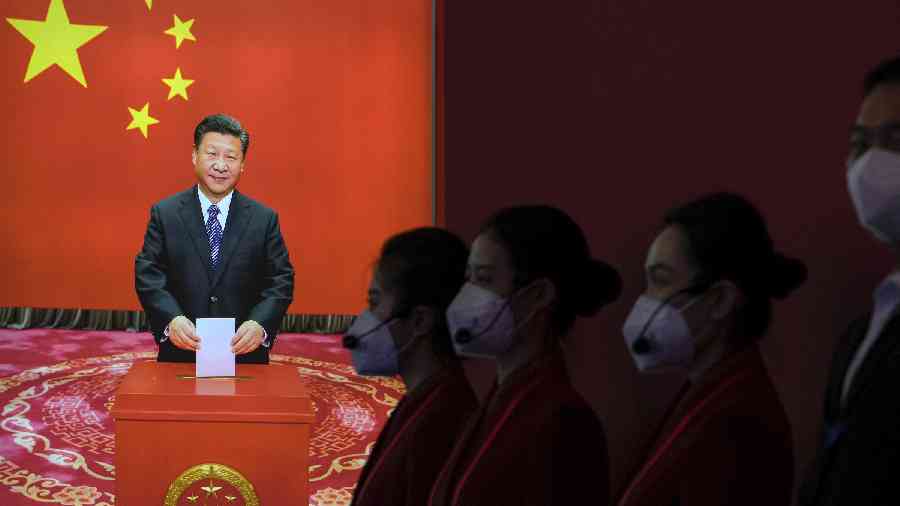The Wodeyar Express doesn’t whiz from airport to city at a reckless 268 miles per hour like China’s magnetic levitation trains. But the 2,296 delegates descending on Beijing to represent 96.7 million Chinese Communist Party members (a 3.7 per cent increase between 2020 and 2021) at Sunday’s 20th National Congress had better watch out. China makes everything under the sun. India makes (and unmakes) history.
Connecting Mysuru and Bengaluru, the Wodeyar Express does both. By shunting aside the 42-year-old superfast Tipu Express, it has taken India closer to erasing the “1,200 years of slave mentality” that Narendra Modi denounces. It now remains to rename the Red Fort which is better known for a bedecked prime minister’s annual address than its erstwhile Mughal inmates. Our make-believe is the world’s envy. “Why didn’t we think of that!” lamented an Irishman in 1969 on learning that Jyoti Basu had transformed Calcutta’s Ochterlony Monument into a martyrs memorial at no cost. The Irish had gone to the trouble of blowing up Nelson’s Pillar, a similar edifice in Dublin, because a monument to an Englishman offended patriotic sentiment. If Modi follows Basu’s revolution-made-easy path, chroniclers for whom history began in 2014 would not need even to mention Hyder Ali and his son, leave alone record that they ousted the Wodeyar maharajas and exiled them for nearly 40 years until the British needed a tame prince.
That was the past. The extravaganza in Beijing’s Great Hall of the People is the future that all Asian rulers yearn for. The preceding elections, the strict watch on minority groups, and the elaborate security (of which Delhi’s Republic Day parade is a pale shadow) probably appeal more to India’s leaders than to Indians conditioned by Jawaharlal Nehru’s liberal democratic ethic. Just as Richard Nixon enviously watched Zhou Enlai pass the next day’s People’s Daily, Britain’s Tony Blair disastrously followed George W. Bush into the Afghan and Iraqi quagmires because of his blind admiration of the power that the American president wielded. Others too can delude themselves into believing that labelling whiskey, gin and rum IMFL (India Made Foreign Liquor) promotes prohibition.
Indians must admire many of the enigmatic Xi Jinping’s actions. He is credited with cleansing public life, rooting out corruption, controlling Covid and giving a fillip to entrepreneurs. Many Chinese are convinced that just as Mao united their country and Deng Xiaoping helped it prosper, Xi’s foreign policy will make it great again. His determination that “the Chinese people will never allow any foreign forces to bully, oppress or enslave” them resonates throughout Afro-Asia. But Xi is also described as more authoritarian than Mao. His ‘re-education’ camps in Xinjiang are accused of human rights abuses against Uighurs and other minority ethnic groups. After subjugating Tibet, he has brought Hong Kong to heel and vowed to “reunite” Taiwan, by force if necessary.
What can India expect from a ruler who is expected to be nominated next week for a third term, appointed chairman and perhaps also honoured with ‘the people’s leader’ title? Li Peng, China’s premier during 1987- 1998, once compared India and China to two goats facing each other on a narrow bridge that could allow only one to pass. No matter what happens at the 20th Congress, Xi is unlikely to give way on the bridge unless it directly benefits his own prospects.
India has other worries at home. Now that Tipu has been annihilated more decisively than at Srirangapatna, there remains the question of what to do with the stormy petrel of a former imam, Nurur Rehman Barkati, of Calcutta’s 180-year-old Tipu Sultan Mosque. Media reports say Barkati held prayers for Osama bin Laden, issued a fatwa against Bengal’s former Bharatiya Janata Party chief, Dilip Ghosh, and vowed to thrash Muslims who joined the BJP or the Rashtriya Swayamsevak Sangh. Not content with issuing a fatwa against Modi himself for the partial demonetisation of 2016, he offered Rs 25 lakh to anyone who “cut off PM Narendra Modi’s beard, shave[d] his head and smear[ed] him with black ink”.
There might be a link between this tirade and the prime minister waxing eloquent about the mighty Chhatrapati Shivaji Maharaj and his fleet of 60 warships and 5,000 men who “frightened” the colonial powers (Britain? France? Portugal?) into submission. Of course, Shivaji is a Hindu icon and vote-catcher in Maharashtra but Modi was also reminding China that however laidback India might have appeared in Galwan, an Indian did manage (albeit two centuries later) a tit for the tat of China’s Admiral Zheng He who reached Kozhikode in the 15th century. That Zheng He was born Ma He, a Muslim, must have made trumping him that much more satisfying: indeed, Yogeshwar Acharya, the Hindutva stalwart whom this newspaper quoted as inciting people to “identify” Muslims “and kill them one by one”, may have been trying to take punishment to its ultimate conclusion. Barkati’s first brush with the authorities — over marrying a Muslim boy to a transgender bride — also offers a link: history knows Zheng He or Ma He as the ‘Eunuch Admiral’.
A country like India with a glorious history boasted naval pioneers long before a freebooting Mahratta chieftain carved a bailiwick out of the ruins of the Bijapur sultanate, terrorised Bengal’s peasantry, and forced the British to excavate a moat round Calcutta. Satyendranath Dutta’s evocative Ekoda jahar Vijaya senani helai Lanka korilo joi (Once there was a warrior whose army easily conquered Lanka) eulogises one seafaring hero. Rajaraja Chola and his son, Rajendra Chola, triumphantly epitomised another. The military, economic and cultural empire they established in South and Southeast Asia dominated the Malayan peninsula, devastated the Srivijaya kingdom in Sumatra, and entered into commercial and diplomatic relations with China’s Tang and Song dynasties as well as the Abbasid Calipha te in Baghdad. Perhaps Modi was silent on Vijaya’s exploits in Lanka because even ancient Bengal is an irritant. Perhaps, being Shaivites, the Chola kings are not regarded as quite kosher Hindus by today’s saffron warriors whose religion is their only politics.
The CPC’s 20th Congress has been called the century’s most significant. It might be that in its unprecedented elevation of a latter-day Mao whose survival and success someone attributed to “being redder than red”. China is still in the ascendant stage and next week’s announcements reflecting Beijing’s provocative stance on land and maritime borders might further confirm ambitions to revise a world order that is seen as archaic. With Xi glorying as a restorer whose Thoughts on Socialism with Chinese Characteristics for a New Era is today’s equivalent of Mao’s Little Red Book, China has yet to evolve a reformer like Nikita Khrushchev who famously proclaimed the end of the “dictatorship of the proletariat” at the Soviet Communist Party’s 22nd Congress.
Instead, Chinese veterans — like Britain’s Labour politicians who became Tory peers — transferred power to the taizidang or princelings, children of the elite like Xi himself. The system sanctions a degree of control that reeks not of proletariat or princelings but imperial absolutism. Xi boasts that thanks to the party bodies he has set up with new powers to oversee the normal functioning of his ministries, “Government, the army, society and schools, east, west, south, north and centre — the party leads them all.” Asian politicians who also hope to enjoy total control free of parliamentary constraints or media scrutiny must have been dismayed this week when a squeak of dissent, albeit quickly suppressed, from the northwestern Beijing district of Haidian warned that even the watchful Big Brother may be under watch.











